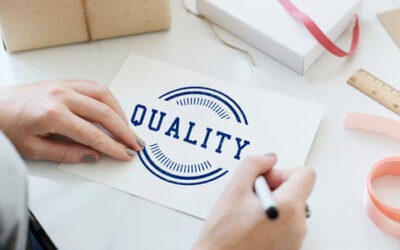9 Specific Product Audit Types
We explore various types of product audits, including functional, quality, safety, regulatory compliance, customer satisfaction, environmental impact, ethical sourcing, product recall, and end-of-life audits. Each audit type assesses different aspects of a product’s lifecycle, ensuring performance, compliance, and sustainability while aligning with customer expectations and legal standards.

Auditing products is an essential activity that ensures the products meet certain standards of functionality, quality, safety, and compliance. Different types of product audits focus on various facets of the product lifecycle. These include functional, quality, safety, regulatory compliance, customer satisfaction, environmental impact, ethical sourcing, product recalls, and end-of-life management. Each of these audits provides valuable insight into the product’s performance, user experience, and adherence to various legal and ethical standards. We will explore each of these audit categories in detail, discussing their objectives, processes, and significance. Resources such as scientific articles, industry guidelines, and audit handbooks have been consulted to provide an in-depth understanding of these audits.
1. Functional Product Audits
Functional product audits focus primarily on evaluating a product’s functionality, performance, and usability. These audits aim to ensure that the product performs as intended and meets the functional requirements specified during its design and development phase.
Key Objectives:
- Verification of Performance: The primary goal is to verify that the product delivers the expected performance under various operating conditions.
- Usability Testing: Functional audits include usability testing to assess how easy and intuitive the product is for the end user.
- Compatibility Checks: Products are evaluated for their compatibility with other systems or products they are designed to integrate with.
- Software Functionality: For software products, functional audits also verify that the software operates correctly, adheres to specified algorithms, and is free of critical bugs.
Audit Process:
Functional product audits begin by identifying the functional specifications of the product, which often come from design documents or technical requirements. The auditor then develops test cases or scenarios to evaluate whether the product performs its functions as intended. This might involve a combination of lab tests, field tests, and user feedback sessions to gain a comprehensive understanding of the product’s functional capabilities.
Significance:
Ensuring a product functions as intended is crucial for customer satisfaction and brand reputation. A malfunctioning product can lead to negative reviews, product returns, and loss of consumer trust. Therefore, functional product audits play a vital role in maintaining the operational integrity of a product throughout its lifecycle.
2. Quality Product Audits
Quality product audits assess the product’s quality attributes, including durability, reliability, and aesthetics. These audits help companies ensure that their products not only meet customer expectations but also perform consistently over time.
Key Objectives:
- Durability and Longevity: The audit ensures that the product is designed to last and maintain its functionality after repeated use or in harsh environments.
- Reliability Testing: This aspect focuses on the product’s ability to perform consistently without failure over time.
- Aesthetic Evaluation: The visual and tactile qualities of the product are evaluated to ensure that it meets design expectations and customer preferences.
Audit Process:
Quality audits often involve rigorous testing, such as stress tests, drop tests, and endurance tests, to ensure the product can withstand regular use or challenging conditions. These audits might also include statistical process control (SPC) to monitor production processes and identify areas where quality improvements are needed. Reliability testing often employs accelerated life testing (ALT) to simulate long-term use and predict the product’s lifespan.
Significance:
High-quality products not only attract customers but also reduce the risk of costly returns, warranty claims, and negative publicity. Quality audits help ensure that the product meets or exceeds the expectations set by the manufacturer and the consumers, maintaining a competitive edge in the market.
3. Safety Product Audits
Safety product audits evaluate the product’s safety features and compliance with safety regulations. These audits are critical in industries such as automotive, healthcare, electronics, and toys, where product safety is paramount.
Key Objectives:
- Hazard Identification: Identifying any potential hazards associated with the product, such as electrical risks, sharp edges, or choking hazards.
- Compliance with Safety Standards: Ensuring that the product complies with relevant safety standards, such as those set by regulatory bodies like the Consumer Product Safety Commission (CPSC) or the European Union’s CE marking.
- Risk Assessment: Evaluating the likelihood and severity of any risks and determining whether safety controls are adequate.
Audit Process:
Safety audits typically involve physical inspections of the product, testing for mechanical, electrical, and environmental hazards. In some cases, destructive testing is used to determine how a product behaves under extreme conditions. The audit also examines safety labels, warnings, and instructions to ensure they are clear and adequate for the user.
Significance:
Safety audits protect consumers from harm and help manufacturers avoid liability. A product recall due to safety issues can severely damage a company’s reputation and lead to significant financial losses. Regular safety audits help mitigate these risks by identifying potential safety issues before the product reaches the market.
4. Regulatory Compliance Audits
Regulatory compliance audits ensure that a product meets all relevant regulations and industry standards. These audits are essential for products that are subject to strict regulatory oversight, such as medical devices, pharmaceuticals, food products, and electronic goods.
Key Objectives:
- Adherence to Laws and Regulations: Ensuring the product complies with all applicable laws, such as FDA regulations for medical devices or RoHS (Restriction of Hazardous Substances) for electronics.
- Certification and Labeling: Verifying that the product carries the required certifications, such as UL, CE, or FCC marks, and that all labeling is accurate and informative.
- Documentation Review: Ensuring that all necessary documentation, such as safety data sheets (SDS) or technical files, is complete and up-to-date.
Audit Process:
Regulatory audits involve reviewing the product against a checklist of applicable regulations. This might include testing for prohibited substances, verifying the accuracy of product labeling, and reviewing documentation for compliance. In industries like pharmaceuticals, audits also evaluate Good Manufacturing Practices (GMP) to ensure that the product is produced in a controlled and consistent manner.
Significance:
Non-compliance with regulations can result in product bans, fines, or costly recalls. Regulatory audits ensure that the product can be legally sold in its target markets and that it does not pose any legal or safety risks to consumers.
5. Customer Satisfaction Audits
Customer satisfaction audits gather feedback from customers to assess the product’s performance in the real world and identify areas for improvement. These audits help companies align their product development efforts with customer needs and preferences.
Key Objectives:
- Assessing Customer Feedback: Collecting data on customer satisfaction through surveys, interviews, and reviews.
- Identifying Product Strengths and Weaknesses: Analyzing feedback to determine what customers like and dislike about the product.
- Measuring Repeat Purchase Intentions: Gauging customer loyalty and the likelihood of repeat purchases.
Audit Process:
Customer satisfaction audits typically involve a combination of quantitative and qualitative research methods. Surveys and questionnaires are used to gather numerical data on customer satisfaction, while focus groups or interviews provide deeper insights into customer experiences. These audits may also track Net Promoter Scores (NPS) to measure customer loyalty and gauge the overall success of the product in the market.
Significance:
Customer satisfaction audits are essential for continuous improvement. They allow manufacturers to make informed decisions about future product enhancements and innovations based on real-world user feedback. Moreover, these audits can prevent product failure by identifying and addressing customer concerns early in the product lifecycle.
6. Environmental Impact Audits
Environmental impact audits evaluate the product’s environmental footprint and compliance with environmental regulations. These audits focus on the product’s sustainability, including its energy consumption, resource use, and impact on ecosystems.
Key Objectives:
- Evaluating Resource Efficiency: Assessing the product’s use of natural resources, including raw materials and energy, during its production and use.
- Measuring Carbon Footprint: Calculating the total greenhouse gas emissions associated with the product’s lifecycle, from raw material extraction to disposal.
- Compliance with Environmental Regulations: Ensuring that the product meets environmental standards, such as those outlined by the Environmental Protection Agency (EPA) or the European Union’s Eco-Management and Audit Scheme (EMAS).
Audit Process:
Environmental impact audits often involve Life Cycle Assessments (LCAs) to evaluate the product’s environmental performance across all stages of its lifecycle. This includes analyzing the environmental impact of material extraction, manufacturing processes, transportation, product use, and disposal. Auditors may also review the product’s energy efficiency and recyclability to ensure it aligns with environmental sustainability goals.
Significance:
Environmental audits are critical in today’s market, where consumers are increasingly concerned about sustainability. Companies that perform well in environmental audits can enhance their brand reputation, attract eco-conscious consumers, and avoid penalties for environmental non-compliance.
7. Ethical Sourcing Audits
Ethical sourcing audits assess the product’s supply chain for ethical practices, including compliance with labor laws, fair trade principles, and human rights standards. These audits are particularly important for products sourced from regions with high risks of labor exploitation or environmental degradation.
Key Objectives:
- Labor Practices: Ensuring that the workers involved in producing the product are treated fairly and paid a living wage.
- Human Rights Compliance: Verifying that the product is not linked to human rights abuses, such as child labor or forced labor.
- Sustainable Sourcing: Assessing whether the materials used in the product are sourced sustainably and do not contribute to deforestation, habitat destruction, or biodiversity loss.
Audit Process:
Ethical sourcing audits typically involve on-site inspections of factories, farms, or other supply chain entities. Auditors assess working conditions, wages, hours, and employee treatment. They may also review supplier certifications, such as Fair Trade or Rainforest Alliance, to ensure that the product meets ethical sourcing standards.
Significance:
With growing consumer demand for ethically sourced products, companies that demonstrate strong ethical sourcing practices can differentiate themselves in the marketplace. Ethical audits help companies avoid reputational damage and contribute to global efforts to improve labor standards and environmental stewardship.
8. Product Recall Audits
Product recall audits investigate the root causes of product recalls and implement corrective actions. These audits focus on identifying the reasons for the product’s failure and ensuring that similar issues do not arise in future production runs.
Key Objectives:
- Root Cause Analysis: Identifying the factors that led to the product recall, such as design flaws, manufacturing defects, or incorrect usage.
- Implementing Corrective Actions: Developing strategies to fix the underlying issue and prevent future occurrences.
- Evaluating Recall Procedures: Assessing the effectiveness of the company’s recall processes, including communication with customers and regulatory bodies.
Audit Process:
Recall audits begin with a detailed investigation into the specific product failure that led to the recall. This involves reviewing design specifications, manufacturing processes, and quality control procedures to identify any deviations or errors. Auditors then work with the company to implement corrective actions, which may include redesigning the product, improving manufacturing processes, or enhancing quality control measures.
Significance:
Product recalls are costly and damaging to a company’s reputation. Recall audits help companies address product failures quickly and effectively, minimizing the negative impact on consumers and restoring confidence in the brand. Additionally, these audits improve overall product safety and quality by addressing systemic issues within the production process.
9. End-of-Life Product Audits
End-of-life (EOL) product audits evaluate the product’s management practices once it reaches the end of its useful life. These audits focus on the product’s disposal, recycling, and potential for reuse, ensuring that EOL practices are environmentally responsible and economically efficient.
Key Objectives:
- Recyclability: Evaluating how easily the product’s materials can be recycled or repurposed.
- Disposal Practices: Ensuring that the product is disposed of in compliance with environmental regulations, particularly regarding hazardous materials.
- Circular Economy Initiatives: Assessing opportunities to design products for a circular economy, where components are reused, remanufactured, or recycled rather than discarded.
Audit Process:
End-of-life audits involve reviewing the product’s design to assess the feasibility of recycling or reuse. Auditors also investigate the disposal methods used by consumers and companies, including partnerships with recycling facilities or third-party waste management organizations. These audits often recommend changes to product design, such as using recyclable materials or designing for disassembly, to enhance EOL sustainability.
Significance:
With the increasing emphasis on sustainability and the circular economy, EOL audits are becoming more critical for companies looking to minimize their environmental impact. Proper EOL management can reduce waste, lower disposal costs, and contribute to a company’s sustainability goals, improving its public image and compliance with environmental regulations.
Conclusion
Product audits are essential tools for evaluating various aspects of a product’s lifecycle, from functionality and quality to ethical sourcing and end-of-life management. These audits help manufacturers ensure that their products meet customer expectations, comply with regulatory requirements, and align with ethical and environmental standards. Regular audits allow companies to identify areas for improvement, enhance product performance, and maintain a competitive edge in the market.
By focusing on different types of product audits—functional, quality, safety, regulatory compliance, customer satisfaction, environmental impact, ethical sourcing, product recall, and end-of-life management—companies can ensure that they are delivering high-quality, safe, and sustainable products that meet the demands of consumers and regulators alike.
References
- CPSC (Consumer Product Safety Commission) Regulations.
- CE Marking and Regulatory Standards.
- Fair Trade and Ethical Sourcing Standards.
- Life Cycle Assessment Methodology.
- Net Promoter Score Methodology.
- ISO Quality Management Standards.
- Environmental Protection Agency (EPA) Guidelines.
- Good Manufacturing Practices (GMP).
- Eco-Management and Audit Scheme (EMAS).
Wanna know more? Let's dive in!
ISO 9001 Checklist: A Step-by-Step Guide to Implementation
[dsm_gradient_text gradient_text="ISO 9001 Checklist: A Step-by-Step Guide to Implementation" _builder_version="4.27.0" _module_preset="default" header_font="Questrial|||on|||||" header_text_align="center" header_letter_spacing="5px" filter_hue_rotate="100deg"...
Read this before you read ISO 9001
[dsm_gradient_text gradient_text="The 7 principles of quality management" _builder_version="4.27.0" _module_preset="default" header_font="Questrial|||on|||||" header_text_align="center" header_letter_spacing="5px" filter_hue_rotate="100deg" hover_enabled="0"...
When AI Met ISO 9001
[dsm_gradient_text gradient_text="When AI Met ISO 9001" _builder_version="4.27.0" _module_preset="default" header_font="Questrial|||on|||||" header_text_align="center" header_letter_spacing="5px" filter_hue_rotate="100deg"...
Sustainability Through Collaboration Building a Greener Future Together
[dsm_gradient_text gradient_text="Sustainability Through Collaboration: Driving Change Across Industries" _builder_version="4.27.0" _module_preset="default" header_font="Questrial|||on|||||" header_text_align="center" header_letter_spacing="5px"...
Why Sustainable Car Design Matters
[dsm_gradient_text gradient_text="A Comprehensive Exploration of Agile Auditing" _builder_version="4.27.0" _module_preset="default" header_font="Questrial|||on|||||" header_text_align="center" header_letter_spacing="5px" filter_hue_rotate="100deg"...
Cultivating a Quality Culture: Guide to Organizational Excellence
In today’s rapidly evolving global marketplace, organizations across various sectors are recognizing the critical importance of fostering a culture centered on quality. This emphasis is not merely about adhering to standards or regulations but involves embedding quality into the very fabric of an organization’s ethos, operations, and interactions. A robust quality culture ensures that every member, from top leadership to frontline employees, is committed to continuous improvement, customer satisfaction, and operational excellence.
The Hidden Costs of Human Error in Healthcare
Human error is a significant challenge in healthcare, where even minor mistakes can have serious consequences. Unlike other industries, errors in healthcare directly affect human lives, making patient safety a top priority. The increasing complexity of modern healthcare, with its integration of technology and electronic health records, introduces both opportunities and challenges. The need for quality assurance is paramount in reducing human errors and ensuring high standards of patient care.
Consistency in Quality: The Foundation of Total Quality Management
In today’s fast-paced and competitive business landscape, ensuring quality is paramount for survival and success. Concepts such as Total Quality Management (TQM), Lean Manufacturing, and Time-Based Competition have gained prominence as organizations strive to enhance efficiency, reduce waste, and improve customer satisfaction. However, one of the most overlooked yet critical factors for the successful implementation of these quality programs is consistency in quality. Without consistency, even the most well-planned quality strategies may fail to yield the desired results.
Software Engineering Process and Quality Assurance Framework
The automotive industry is experiencing rapid transformation, driven by advances in technology, increasing competition, and evolving customer expectations. To stay ahead in this dynamic landscape, companies must continuously innovate while optimizing costs. One of the most effective strategies for achieving these objectives is outsourcing software development and engineering processes.
Elevating Software Quality in Automotive Engineering
In the ever-evolving landscape of automotive engineering, ensuring high software quality is a key challenge. With the increasing complexity of vehicle functionalities and the integration of advanced driver-assistance systems (ADAS), maintaining stringent quality standards is essential. Volkswagen introduced the Software Quality Improvement Leader (SQIL) initiative to bridge the gap between software quality and supplier collaboration, ensuring the highest standards in automotive software development.
The Future of Batteries: How Organic Batteries Are Changing the Game
Organic batteries are on the rise, offering safer, greener, and cheaper alternatives to traditional batteries. As research progresses, we can expect longer-lasting, flexible, and biodegradable batteries powering our future devices.
Organic Thermoelectrics: Turning Heat into Power
Imagine if you could charge your phone just by wearing your hoodie, or if your laptop could recycle its own heat to power itself. Sounds futuristic, right? Well, organic thermoelectrics are making this a reality! This cool (or should we say hot?) technology is all about using special materials to turn wasted heat into usable electricity.












